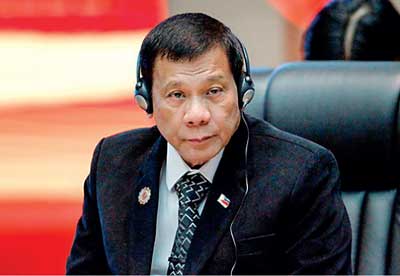Monday Feb 23, 2026
Monday Feb 23, 2026
Friday, 9 September 2016 00:01 - - {{hitsCtrl.values.hits}}
From left: Myanmar’s State Counsellor Aung San Suu Kyi, Singapore’s Prime Minister Lee Hsien Loong, Thailand’s Prime Minister Prayuth Chano-cha, Vietnamese Prime Minister Nguyen Xuan Phuc, Chinese Premier Li Keqiang, Laos Prime Minister Thongloun Sisoulith, Philippines President Rodrigo Duterte, Brunei’s Sultan Hassanal Bolkiah, Cambodia’s Prime Minister Hun Sen, Indonesia’s President Joko Widodo and Malaysian Prime Minister Najib Abdul Razak pose for photo during ASEAN-China Summit in Vientiane, Laos September 7, 2016. REUTERS
Reuters: Asian leaders played down tensions over the South China Sea in a carefully worded summit statement on Thursday, but even before it was issued Beijing voiced frustration with countries outside the region “interfering” in tussles over the strategic waterway.
The heads of 10 Southeast Asian nations, as well as US President Barack Obama and Chinese Premier Li Keqiang among six other leaders, “reaffirmed the importance of maintaining peace, stability, security and freedom of navigation in and over-flight in the South China Sea.”
But the draft of a statement to be issued in Vientiane, Laos, tiptoed around the regional strains caused by competing claims to areas of the strategically important sea.
“Several leaders remained seriously concerned over recent developments in the South China Sea,” said the draft.
The statement, seen by Reuters, made no reference to a July ruling by a court in The Hague that declared illegal some of China’s artificial islands in the sea and invalidated its claims to almost the entire waterway.
Obama said on Thursday the ruling had helped clarify maritime rights. “I recognise this raises tensions but I also look forward to discussing how we can constructively move forward together to lower tensions,” he said at a summit meeting.
Officials said that talks on Wednesday between leaders of the Association of Southeast Asian Nations (ASEAN) and China’s Li had gone smoothly.
But in a statement later from China’s Foreign Ministry, Li was paraphrased as saying China was willing to work with Southeast Asian countries in “dispelling interference ... and properly handling the South China Sea issue”.
He did not elaborate, but such wording is typically used by Chinese leaders to refer to not allowing countries from outside the region with no direct involvement in the dispute, like the United States, from getting involved.
China claims much of the South China Sea, through which more than $ 5 trillion of trade moves annually. Taiwan and four ASEAN members - Vietnam, the Philippines, Malaysia and Brunei - also have claims, making it a hot spot of regional tension.
The other ASEAN nations are Cambodia, Indonesia, Laos, Myanmar, Singapore and Thailand. Leaders from Australia, China, India, Japan, New Zealand, Russia, South Korea and the United States also attended the summit.
 Vientiane (Reuters): Philippines President Rodrigo Duterte on Thursday defended his country’s human rights record at a regional summit in Laos, urging East Asian leaders and the United States to help Manila eradicate the scourge of illicit drugs.
Vientiane (Reuters): Philippines President Rodrigo Duterte on Thursday defended his country’s human rights record at a regional summit in Laos, urging East Asian leaders and the United States to help Manila eradicate the scourge of illicit drugs.
Duterte swept to power in May on promises to wipe out crime and corruption within six months, pledging to wage a war on drug dealers and crush widespread addiction in a country of 100 million.
The toll in his government’s two-month war on drugs reached 2,400 last week, with police saying about 900 people died in police operations, and the rest were “deaths under investigation”, a term human rights activists call a euphemism for vigilante and extrajudicial killings.
Setting aside a prepared speech, Duterte spoke for more than five minutes about human rights and his campaign against drugs during the East Asian Summit in the Laotian capital of Vientiane, according to one Indonesian diplomat at the meeting.
“Let me tell you about human rights,” the diplomat quoted Duterte as saying while displaying a picture of Filipinos killed by American soldiers about a century ago.
“This is my ancestors being killed, so why now we are talking about human rights? We have to talk of the full spectrum of human rights.”
Duterte spoke after Obama had delivered a speech that referred to human rights.
Duterte’s drive has won popular support at home but the killings have drawn expressions of concern from the United States, a close Philippine ally, and the United Nations.
In a tirade before the Laos summit, Duterte insulted US President Barack Obama and the White House responded by cancelling a two-way meeting.
Philippine officials this week handed out a 38-page pamphlet at the summit that praised Duterte’s drug campaign.